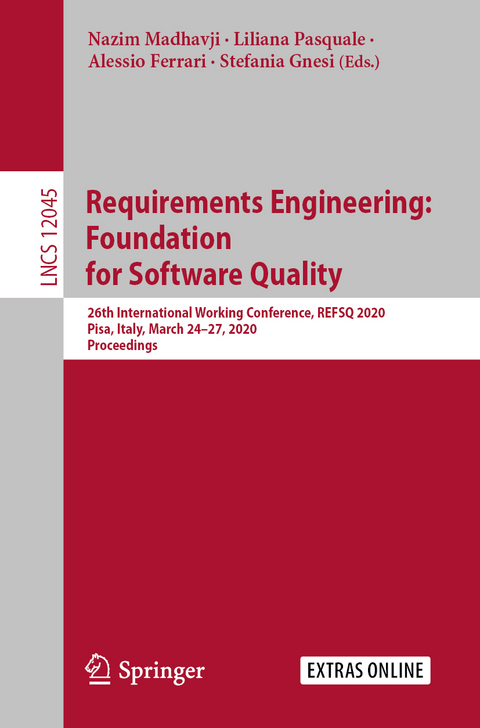
Requirements Engineering: Foundation for Software Quality
Springer International Publishing (Verlag)
978-3-030-44428-0 (ISBN)
This book constitutes the proceedings of the 26th International Working Conference on Requirements Engineering - Foundation for Software Quality, REFSQ 2020, which was due to be held in Pisa, Italy, in March 2020. Due to the COVID-19 pandemic the conference was held virtually in June 2020.
The 14 full papers and 7 short papers in this volume were carefully reviewed and selected from 84 submissions. The papers are organized in the following topical sections: requirements specification; requirements documentation; privacy and legal requirements; stakeholders feedback and training; agile methods and requirements comprehension; requirements modelling; requirements visualization.
Requirements Specification.- How do Quantifiers Affect the Quality of Requirements?.- Generation of Formal Requirements from Structured Natural Language.- Using Eye Tracking Data to Improve Requirements Specification Use.- Requirements Documentation.- Hearing the Voice of Software Practitioners on Causes, Effects, and Practices to Deal with Documentation Debt.- Innovation Workshop Documentation for Following Software Engineering Activities.- Industrial Practices on Requirements Reuse: An Interview-based Study.- Privacy and Legal Requirements.- Disambiguating Requirements through Syntax-Driven Semantic Analysis of Information Types.- On Understanding How Developers Perceive and Interpret Privacy Requirements Research Preview.- A Methodology for Implementing the Formal Legal-GRL Framework: A Research Preview.- Stakeholders Feedback and Training.- Towards Integrating Data-Driven Requirements Engineering into the Software Development Process: A Vision Paper.- Identifying and Classifying User Requirements in Online Feedback via Crowdsourcing.- Designing a Virtual Client for Requirements Elicitation Interviews.- Agile Methods and Requirements Comprehension.- Explicit Alignment of Requirements and Architecture in Agile Development.- Applying Distributed Cognition Theory to Agile Requirements Engineering.- Automatic Word Embeddings-Based Glossary Term Extraction from Large-Sized Software Requirement.- Requirements Modelling.- Conceptualizing Requirements Using User Stories and Use Cases: A Controlled Experiment.- A Semi-Automated Approach to Generate an Adaptive Quality Attribute Relationship Matrix.- Evaluating the Effects of Different Requirements Representations on Writing Test Case.- Requirements Visualization.- Vision Meets Visualization: Are Animated Videos an Alternative?.- Requirements Assessment in Smart City Districts: A Motivation Concept for Citizens.- Visualizing Feature-Level Evolution in Product Lines: AResearch Preview.
| Erscheinungsdatum | 20.03.2020 |
|---|---|
| Reihe/Serie | Lecture Notes in Computer Science | Programming and Software Engineering |
| Zusatzinfo | XV, 308 p. 86 illus., 48 illus. in color. |
| Verlagsort | Cham |
| Sprache | englisch |
| Maße | 155 x 235 mm |
| Gewicht | 498 g |
| Themenwelt | Informatik ► Software Entwicklung ► Requirements Engineering |
| Schlagworte | Applications • Artificial Intelligence • Computer Hardware • computer programming • Computer Science • Computer systems • conference proceedings • functional requirement • Human-Computer Interaction (HCI) • Informatics • Linguistics • Natural Languages • object-oriented programming • quality requirements • Requirements Engineering • Research • software architecture • Software Design • Software engineering • software project • System requirements |
| ISBN-10 | 3-030-44428-7 / 3030444287 |
| ISBN-13 | 978-3-030-44428-0 / 9783030444280 |
| Zustand | Neuware |
| Haben Sie eine Frage zum Produkt? |
aus dem Bereich


